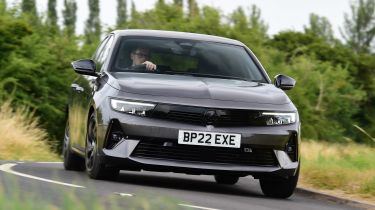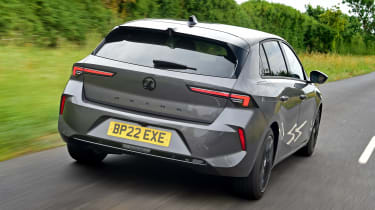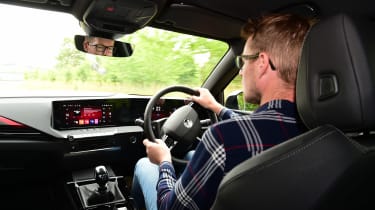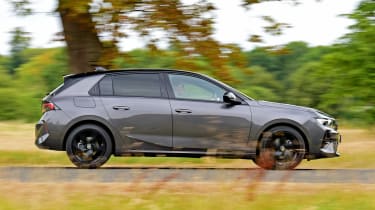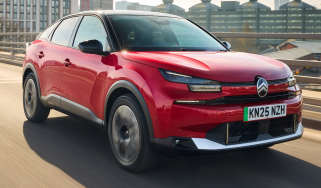New Vauxhall Astra 2022 review
The new Vauxhall Astra has arrived in the UK to take on the Volkswagen Golf and Ford Focus

Verdict
This eighth-generation Astra is a return to form for Vauxhall. It handles well and offers a solid slice of comfort, practicality (we'd still like a little more legroom, though) and refinement, while this petrol model's performance is just enough. The boot is big, the tech is strong and as a value proposition the Astra is appealing, also helped by its strong list of standard kit and smart styling. Despite more pressure than ever on the family hatchback sector from the ever-expanding crops of SUVs, the Astra offering is stronger than ever.
Now into its eighth generation, the latest Astra is a significant car for Vauxhall. The brand took the top spot for registrations with its Corsa supermini last year, and this new Astra is looking to build on this success with smart design, plenty of tech and electrified powertrains alongside pure petrol models to keep the population interested in one of Britain's best-selling nameplates.
Let's start with the looks, because whether you like it or not, this new car is certainly more modern than the dowdy old five-door family hatch it replaced. The look features more than a few design elements that are similar to the latest Volkswagen Golf 8; as they say, if you can't beat them...
But that's doing the Vauxhall a disservice, because in the metal it's a cohesive piece of car design that gives the Astra real personality – and you couldn't always say that about previous generations of the car.
Used - available now

2019 Vauxhall
Astra
22,570 milesAutomaticPetrol1.4L
Cash £9,995
2019 Vauxhall
Astra
65,530 milesManualPetrol1.4L
Cash £7,495
2023 Vauxhall
Astra
11,857 milesManualPetrol1.2L
Cash £18,300
2021 Vauxhall
Astra
29,275 milesManualPetrol1.2L
Cash £10,706The same is true on the inside, where the firm's Pure Panel combines a digital dash and a central touchscreen, both sized at 10-inches (for now – more on this later) on this mid-spec GS Line test car that we've tried here in the UK.
Incidentally, this will make up 65 per cent of sales, and combined with the 128bhp 1.2-litre three-cylinder turbo petrol manual powertrain we've tried, will be the most popular Astra in the newly simplified range. Entry-level Design and top-spec Ultimate sit either side of our test car, with Vauxhall having slimmed its overall model, engine and trim line-up down from 362 derivatives to a much more manageable 54.
Under the skin the Astra uses the latest V3 version of the Stellantis EMP2 platform, with 50 per cent new parts compared with the previous architecture. This is what has made a full Astra EV (coming next year) possible, while the firm has fine-tuned elements of this architecture to differentiate it from sister brand Peugeot, which also uses this tech for its recently revised 308 family hatch. The steering, suspension damper rates and bump stops, as well as the anti-roll bar set-up, have all been tweaked for the Astra, with a focus on stability at higher speeds.
On the move the Astra feels sporty. Even on our car's 17-inch alloys (18s are fitted on top-spec cars) there's a firm edge to the ride, but it doesn't seriously impact comfort; it's more that the Astra's chassis is tautly controlled, which gives a sense of driving satisfaction the car hasn't ever offered. Speed helps smooth out this trait to a point too, so on ribbed and rucked country roads the Vauxhall's suspension copes relatively well with cambers and bumps, yet it also delivers enough support to give a sense of engagement.
Roll is nicely controlled and the sportier tuning over, say, a 308 means the Astra's front axle turns in fairly keenly, helped by light but precise steering. We'd stick with the default setting though, as Sport mode adds too much artificial weight. While it's not quite as agile or as enjoyable to drive as a Ford Focus, it's one of the more dynamic family hatchbacks on offer.
It's also relatively refined. All models feature a soundproofed windscreen, and the Astra's low drag coefficient of 0.269 means it cuts through the air sharply.
But this refinement serves to highlight that the 1.2 Turbo unit is a little grumbly under hard load. At a cruise it's quiet, but the characterful thrum becomes pretty noticeable if you aim for the 9.7-second 0-60mph time Vauxhall claims for this manual model.
We have no major issues with the performance though. With a maximum of 230Nm of torque and some clever weight-saving tech such as the boot lid made from thermoplastic, the Astra serves up just enough flexibility so you don't have to work the gearbox too hard.
The six-speed transmission's shift is acceptable – not the most precise but not the wooliest either – and overall the ergonomics inside are good, helped by seats that are good for your spine, as certified by AGR, the Campaign for Healthier Backs in Germany.
This includes the placement of the Pure Panel screens; the two 10-inch panels look good and work well, boasting plenty of features, including wireless Android Auto and Apple CarPlay, plus a natural voice recognition system that proved intuitive and accurate to use for us.
MY23 Astras will feature the Pure Panel Pro set-up, which offers a pair of flush-fitting 12-inch screens; the standard set-up doesn't look at all bad until you see and experience the Pro pack, which will be standard on GS Line trim from next year.
Whichever system you get, thankfully Vauxhall has retained physical climate controls that are easy to use on the move, the ledge their mounted on acting as a good anchor point for your hand to operate the screen.
It's clear from the interior and exterior design that Vauxhall is going after the Volkswagen Golf, and there are some nice materials inside, including soft-touch plastics and some smart leather inserts on the doors. However, some significant areas of cheaper plastic are obvious higher up, such as on the doors, which just lets the image down a little.
It's a shame, because the Astra is a striking car from the outside, with the Vizor grille and horizontal LED headlights accentuating its width, along with chunky wheel arches, especially at the rear.
The tail-lights and the Astra's simple, solid-looking surfaces – as well as some of the key body work creases, particularly on the boot lid with its VW-style push-to-open badge – are reminiscent of Volkswagen and Skoda models. We mean that as a compliment.
That sharply styled tailgate reveals a 422-litre boot, which is a good size for the class, although rear packaging isn't the greatest and we'd like a little more legroom. Head room is fine though, and there's plenty of storage inside the cabin, with a big lidded cubby between the front seats, cup-holders, two trays with sliding covers, and a neat fold-out compartment below the climate controls for phones or sunglasses.
Other competitive numbers the Astra offers include claimed efficiency of 51.3mpg and 124g/km of CO2, but the headline price of £27,210 for this most popular mid-spec model is also important.
Compared with a mid-spec Golf with an identical amount of power, it's around £500 cheaper – and Vauxhall will throw in another £500 discount with an online order at the moment, plus a £750 deposit contribution if you buy on finance.
For that you get loads of kit, including the Pure Panel set-up (soon to be Pro for no extra cash), LED headlights, adaptive cruise control, the latest smartphone connectivity tech, dual-zone climate control, heated seats, a 360-degree parking camera, full keyless go, sportier looks and plenty of driver assistance and safety tech, with AEB with pedestrian detection and collision alert, lane departure warning and lane keep assist, plus traffic sign recognition.
| Model: | Vauxhall Astra 1.2 Turbo 130 GS Line |
| Price: | £27,210 |
| Engine: | 1.2-litre 3cyl turbo petrol |
| Power/torque: | 128bhp/230Nm |
| Transmission: | Six-speed manual, front-wheel drive |
| 0-62mph: | 9.7 seconds |
| Top speed: | 130mph |
| Economy/CO2: | 51.3mpg/124g/km |
| On sale: | Now |

